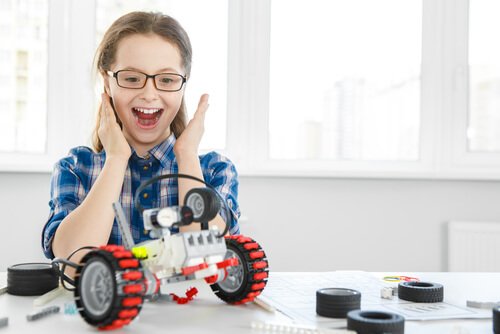Characteristics of Gifted Children in School

Many people say that children are gifted if their IQ is greater than 130. However, these children are hard to detect, since students often meet or exceed this number. Also, gifted children sometimes have poor behavior and as a result, don’t do well in school.
To prevent them from getting bored, it’s important for parents of gifted children to help them deal with this educational stage. Often, schools don’t have the resources to help these special children. This means they can’t give these students the academic challenges they need.
Giftedness in early childhood isn’t a well-known topic, since lots of parents don’t know that their children are extra intelligent.
However, there is a test you can give children very early on to determine whether or not they’re gifted. That way, you can make sure your kids receive the education and support they need to reach their potential.
Characteristics of gifted children according to their age
Babies
- Show lots of interest in learning.
- Interact with their environment early.
- Respond more quickly to visual and auditory stimuli.
- Have photographic memory.
- Start talking early.
Children
- Are very competitive and want to be the best.
- Learn quickly and develop their abilities to the fullest.
- Are perseverant and like to express when they feel proud of themselves.

Teenagers
- Great cognitive ability.
- Highly reflective about things like social, moral and cultural values.
- Like to share and spend time with older people.
- High self-esteem and confidence.
Adults
- Excellent performance at work. They look for good jobs and generally work in a specialized area.
- Isolate themselves.
- High capacity to solve many different kinds of problems.
“The intelligence consists not only in the knowledge, but also in the skill to apply the knowledge into practice.”
–Aristotle–
How to take advantage of the capabilities of gifted children
These children have above-average intellectual abilities. However, not all gifted children are super intelligent.
There are many applied and productive children who aren’t considered gifted. The best way for these geniuses to demonstrate their skills is through school assignments, as well as problem-solving in general.
These children need educational programs that help them develop their intellectual skills to the fullest. There are many models that can support gifted children if schools do them well. Here are two examples:
Skip a grade
The purpose of this educational model is to place children in the grade that suits them best according to their intellectual level, not because of their age.
In general, this becomes obvious in their first year in school. By following this plan, students can go to college at an earlier age to go into specialized fields and postgraduate programs.
In addition, this method assesses kids’ cognitive abilities more rigorously. Therefore, they will make the most of their talents in higher grades.
The great advantage socially is that these kids won’t be frustrated by being with immature classmates. Also, they won’t be as bored in class because the work is too easy for them.
However, this system also has some disadvantages. One of them is that by skipping a grade, students may not be mature enough to handle the most difficult challenges for their age. This could also have consequences, both at school and socially.

Gifted children in the regular education classroom
This is the most common model. It’s where they keep gifted children in the regular education classroom. There, they surround themselves and express themselves with students their age, and advance at a less accelerated pace. However, it doesn’t hinder their knowledge, and they take advantage of all of their possible resources.
As an advantage, these children can learn perfectly in groups of kids with mixed abilities. They enjoy their skills and talents, and are all treated as equals. However, they might get some special attention or guidance to help them feel challenged.
The most common disadvantage is that, by being in a regular classroom, these students will regularly be the best academically without having to try very hard. In this way, they may not explore and develop their skills as much.
To work with gifted children while they’re in school, it’s important to think about both methods of gifted education. That way, you can choose the method that works best for you.
To help gifted children reach their potential in either model, parents and teachers need to help them grow without putting too much pressure or expectations on them. By themselves, gifted children can keep learning and growing.
Many people say that children are gifted if their IQ is greater than 130. However, these children are hard to detect, since students often meet or exceed this number. Also, gifted children sometimes have poor behavior and as a result, don’t do well in school.
To prevent them from getting bored, it’s important for parents of gifted children to help them deal with this educational stage. Often, schools don’t have the resources to help these special children. This means they can’t give these students the academic challenges they need.
Giftedness in early childhood isn’t a well-known topic, since lots of parents don’t know that their children are extra intelligent.
However, there is a test you can give children very early on to determine whether or not they’re gifted. That way, you can make sure your kids receive the education and support they need to reach their potential.
Characteristics of gifted children according to their age
Babies
- Show lots of interest in learning.
- Interact with their environment early.
- Respond more quickly to visual and auditory stimuli.
- Have photographic memory.
- Start talking early.
Children
- Are very competitive and want to be the best.
- Learn quickly and develop their abilities to the fullest.
- Are perseverant and like to express when they feel proud of themselves.

Teenagers
- Great cognitive ability.
- Highly reflective about things like social, moral and cultural values.
- Like to share and spend time with older people.
- High self-esteem and confidence.
Adults
- Excellent performance at work. They look for good jobs and generally work in a specialized area.
- Isolate themselves.
- High capacity to solve many different kinds of problems.
“The intelligence consists not only in the knowledge, but also in the skill to apply the knowledge into practice.”
–Aristotle–
How to take advantage of the capabilities of gifted children
These children have above-average intellectual abilities. However, not all gifted children are super intelligent.
There are many applied and productive children who aren’t considered gifted. The best way for these geniuses to demonstrate their skills is through school assignments, as well as problem-solving in general.
These children need educational programs that help them develop their intellectual skills to the fullest. There are many models that can support gifted children if schools do them well. Here are two examples:
Skip a grade
The purpose of this educational model is to place children in the grade that suits them best according to their intellectual level, not because of their age.
In general, this becomes obvious in their first year in school. By following this plan, students can go to college at an earlier age to go into specialized fields and postgraduate programs.
In addition, this method assesses kids’ cognitive abilities more rigorously. Therefore, they will make the most of their talents in higher grades.
The great advantage socially is that these kids won’t be frustrated by being with immature classmates. Also, they won’t be as bored in class because the work is too easy for them.
However, this system also has some disadvantages. One of them is that by skipping a grade, students may not be mature enough to handle the most difficult challenges for their age. This could also have consequences, both at school and socially.

Gifted children in the regular education classroom
This is the most common model. It’s where they keep gifted children in the regular education classroom. There, they surround themselves and express themselves with students their age, and advance at a less accelerated pace. However, it doesn’t hinder their knowledge, and they take advantage of all of their possible resources.
As an advantage, these children can learn perfectly in groups of kids with mixed abilities. They enjoy their skills and talents, and are all treated as equals. However, they might get some special attention or guidance to help them feel challenged.
The most common disadvantage is that, by being in a regular classroom, these students will regularly be the best academically without having to try very hard. In this way, they may not explore and develop their skills as much.
To work with gifted children while they’re in school, it’s important to think about both methods of gifted education. That way, you can choose the method that works best for you.
To help gifted children reach their potential in either model, parents and teachers need to help them grow without putting too much pressure or expectations on them. By themselves, gifted children can keep learning and growing.
All cited sources were thoroughly reviewed by our team to ensure their quality, reliability, currency, and validity. The bibliography of this article was considered reliable and of academic or scientific accuracy.
- García-Ron, A., & Sierra-Vázquez, J. (2011). Niños con altas capacidades intelectuales. Signos de alarma, perfil neuropsicológico y sus dificultades académicas. Anales de Pediatria Continuada. https://altascapacidades.es/webdocente/Docs_Master_UC_LM/Sintesis%20Signos%20de%20alarma%20y%20perfil%20neuropsicologico.pdf
- Sánchez Cuenca, M., & Sánchez Manzano, E. (1990). Estrategias educativas en la formación de niños superdotados. Revista Complutense de Educación, ISSN 1130-2496, Vol. 1, No 3, 1990, Págs. 487-500. https://revistas.ucm.es/index.php/RCED/article/download/RCED9090330487A/18206
This text is provided for informational purposes only and does not replace consultation with a professional. If in doubt, consult your specialist.








